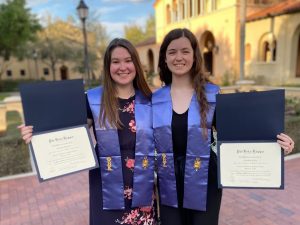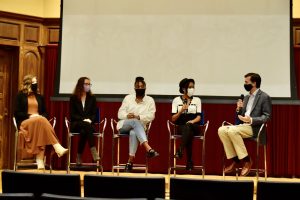On Oct. 27, Spectrum, Rollins’ Gay, Lesbian, Bisexual, Transgender, Ally (GLBTA) organization, hosted “What’s the ‘T’ in LBGT?,” a panel designed to shed more light on what it means to be transgender and further, what it is like to be transgender. Louisa Gibbs ’11 and Ashley Green ’11 helped to create and moderate the panel; both completed a LGBT internship over the summer that opened their eyes to the letter “T” in the aforementioned acronym, which is typically overlooked. According to Green, “We really wanted to come back to Rollins and have a conversation we hadn’t had before.”
The panel itself had five people with various connections to the topic; Davina Hovanec, a computer analyst at UCF, Dr. Jennifer Cavanaugh, assistant professor in Rollins’ Theatre and Arts department, Sam Sanabria, assistant professor in the Rollins Masters in Counseling program, Robyn Kelly, secretary to the Board of Directors of Gender Identity in Florida Today, and Jake Green, a trans-activist who works with the Florida Anti-Violence Project.
For some quick background info, a transgender person is someone who identifies with a gender identity that is different from the sex that they were born with. Cavanaugh began the panel with the idea of general gender identity, saying that though there are at least five genders, the general population looks at gender as a binary system. She described transgender as “the side upon which many binaries crash and burn.” She believes that the reason most trans-people are mistreated is because others have difficulties with their known binary system clashing.
Hovanec then took the floor, but rather than throwing statistics at the audience, she read her story as a trans-person and all of the pain she went through to make the change. According to Hovanec, her mind had always leaned more toward the feminine side, but it took her years to be able to get the surgery done to physically change her body.
To reiterate the difficulties a trans-person faces, Sanabria explained a bit more about the difficulties trans-people face when they go through the process of changing. Sanabria started his portion of the panel by saying, “I want you to know how difficult it is for a transperson to make the decision to change.” He explained that this could be for monetary reasons or uncertainty, but more often than not it is due to a fear of rejection from the person’s family and friends.
Sanabria has known people who have given up everything because they were so afraid that their loved ones would not accept them once they had changed.
Unfortunately, it is not just friends and family who express discrimination toward transgender people. Kelly told a personal story about a doctor who refused to treat her at a hospital. She relayed that the doctor told her that he “didn’t want to catch whatever I had.” What is even more disturbing is that this is not the only time this sort of thing has happened. A young woman went to the hospital seeking treatment one day, but after forcing her to wait in the emergency room for hours, personnel informed her that they could not treat her “transvestite condition.”
Green was next in the lineup; as a trans-person himself, he has made it his mission to provide as much help for other transgender people as possible. “My deepest passion is what I can do to make a difference,” he explained, going into detail about his endeavors to both educate the public about being transgender and create support networks for those in need. “We are who we want to be and it’s hell until we make the steps [to change],” concluded Green.
For more information about transgenders or to seek support, look up Parents, Family and Friends of Lesbians and Gays (PFLAG) at www.pflagorlando. org or find out more information from the Anti-Violence Project at www.avp.org.
















Be First to Comment